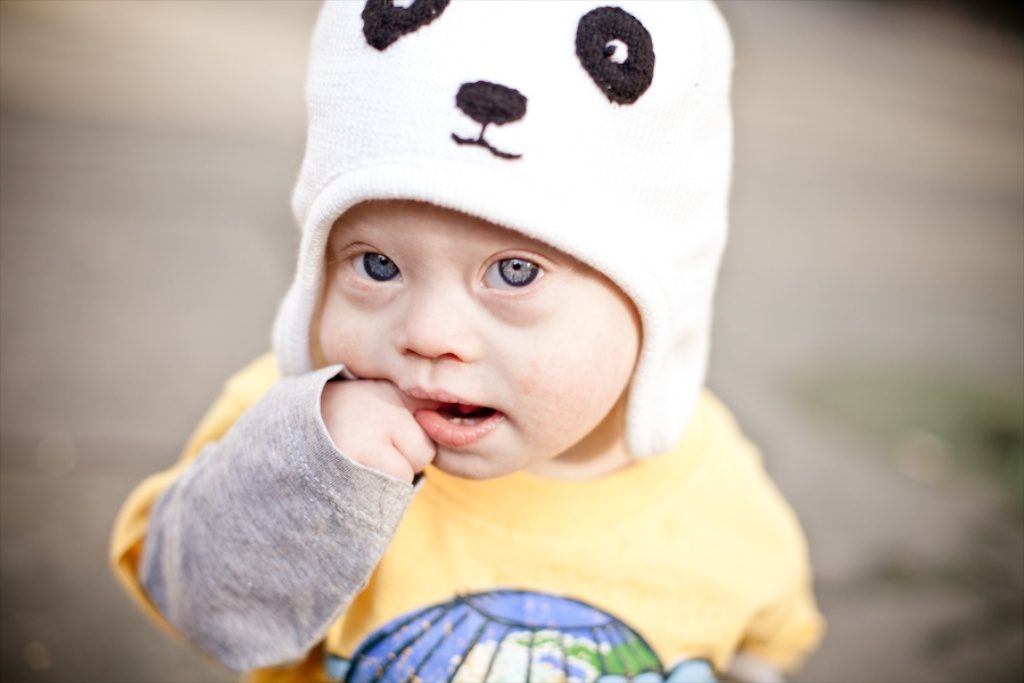It’s Down Syndrome Month BABY!

What is Down Syndrome?
In every cell in the human body, there is a nucleus, where genetic material is stored in genes. Genes carry the codes responsible for all of our inherited traits and are grouped along rod-like structures called chromosomes. Typically, the nucleus of each cell contains 23 pairs of chromosomes, half of which are inherited from each parent. Down syndrome occurs when an individual has a full or partial extra copy of chromosome 21.
This additional genetic material alters the course of development and causes the characteristics associated with Down syndrome. A few of the common physical traits of Down syndrome are low muscle tone, small stature, an upward slant to the eyes, and a single deep crease across the center of the palm – although each person with Down syndrome is a unique individual and may possess these characteristics to different degrees, or not at all.
Down Syndrome Adoption:

A Child with down syndrome is a blessing for his or her siblings, not a curse. “I wish I had known that having a child with Down syndrome would make her older sister even more kind and empathetic. Sharing the spotlight has made her happy, not resentful.” —Shannon Striner
GWCA|CAN has a growing list of children with Down syndrome who are available for adoption—especially in our China Program. Many children around the world have been placed into families as a result of the awareness of the great need for adoptive families willing to make a precious child with Down syndrome part of their family. We want to expand our efforts in advocating for this amazing group of children by sharing just a few of those available on our Photo Listing. We add 5 children to our wait list so be sure to check out our “New Kids on the Block”.
These are just facts, and like all facts, they can fail to provide a full picture. The truth is that children born with Down syndrome can absolutely go on to live happy and long lives. And with Down Syndrome Awareness Month every October, we can be inspired to learn more about this topic and to celebrate people born with Down syndrome and the medical advancements that increasingly improve their quality of life.
When Was Down Syndrome Discovered?
For centuries, people with Down syndrome have been alluded to in art, literature and science. It wasn’t until the late nineteenth century, however, that John Langdon Down, an English physician, published an accurate description of a person with Down syndrome. It was this scholarly work, published in 1866, that earned Down the recognition as the “father” of the syndrome. Although other people had previously recognized the characteristics of the syndrome, it was Down who described the condition as a distinct and separate entity.
In recent history, advances in medicine and science have enabled researchers to investigate the characteristics of people with Down syndrome. In 1959, the French physician Jérôme Lejeune identified Down syndrome as a chromosomal condition. Instead of the usual 46 chromosomes present in each cell, Lejeune observed 47 in the cells of individuals with Down syndrome. It was later determined that an extra partial or whole copy of chromosome 21 results in the characteristics associated with Down syndrome. In the year 2000, an international team of scientists successfully identified and catalogued each of the approximately 329 genes on chromosome 21. This accomplishment opened the door to great advances in Down syndrome research.
Are There Different Types of Down Syndrome?
TRISOMY 21 (NONDISJUNCTION)
Down syndrome is usually caused by an error in cell division called “nondisjunction.” Nondisjunction results in an embryo with three copies of chromosome 21 instead of the usual two. Prior to or at conception, a pair of 21st chromosomes in either the sperm or the egg fails to separate. As the embryo develops, the extra chromosome is replicated in every cell of the body. This type of Down syndrome, which accounts for 95% of cases, is called trisomy 21.
MOSAICISM
Mosaicism (or mosaic Down syndrome) is diagnosed when there is a mixture of two types of cells, some containing the usual 46 chromosomes and some containing 47. Those cells with 47 chromosomes contain an extra chromosome 21.
Mosaicism is the least common form of Down syndrome and accounts for only about 1% of all cases of Down syndrome. Research has indicated that individuals with mosaic Down syndrome may have fewer characteristics of Down syndrome than those with other types of Down syndrome. However, broad generalizations are not possible due to the wide range of abilities people with Down syndrome possess.
TRANSLOCATION
In translocation, which accounts for about 4% of cases of Down syndrome, the total number of chromosomes in the cells remains 46; however, an additional full or partial copy of chromosome 21 attaches to another chromosome, usually chromosome 14. The presence of the extra full or partial chromosome 21 causes the characteristics of Down syndrome.
How to Observe Down Syndrome Awareness Month

“A different life is not a ‘less than’ life. Difference makes the world a richer place to live.”Courtesy of Jillian Benfield
- Join a Buddy Walk: According to the National Down Syndrome Society, the Buddy Walk “has grown to be the world’s largest and most recognizable Down syndrome awareness program with over 250 walks taking place in 50 states and select international countries.”
- Volunteer: There are plenty of things you can do during Down Syndrome Awareness Month, but volunteering with one of the many Down syndrome advocacy groups is one of the best and most effective.
- Spread the word: The Down Syndrome Information Alliance suggests celebrating Down Syndrome Awareness Month by carrying out 31 random acts of kindness — one for each day in October.


About Post Author
I didn't give your the gift of life, but in my heart i know. The love I feel is deep and real, as if it had been so. For us to have each other is like a dream come true. No, I didn't give you the gift of life. Life gave me the gift of you.